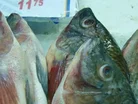Fishing for cost cuts with new machine

A Nigerian aquaculture company is aiming to cut the cost of fish production in the country with the introduction of a new fish feed machine.
Dickem Aquatech’s high tech floating feed production machine would allow fish farmers to produce floating fish feed themselves rather than relying on importing fish feed.
The Lagos-based company unveiled its new technology while showing journalists and bank officials around its 50-acre, 350,000 fish capacity farm and feedmill facility.
Dickem’s managing director Godwin Emakenemi said: “"We have successfully developed new concepts and innovations in aquaculture; our aim is to make this available to other fish farmers so that they too can enjoy the benefits. We have the desire to bring down the cost of feeds and eventually bring down the price of fish in the markets."
The company says the new machine is easy to operate and maintain, and eliminates the old technology of steam and boiler and matches the standard of any foreign feed produced in the world.
The machine comprises a hammer mill, extruder and dryer and is capable of producing 150kg or 10 bags per hour and is most suitable for use by small and medium sized enterprises for which it was designed.
MORE from African Business Review
- Flexible workspace provider Regus expands into Rwanda
- IATA reinforces its commitment to African aviation
- Small farmers could hold key to economic prosperity
Emakenemi said: "Some other feed mills in the country set up similar feed producing mills at the minimum cost of N200 million; fortunately we have been able to design ours in such a way that every farm can have its own fish mill at minimum cost and space."
Nigeria has the capacity to produce four million metric tonnes of fish annually but can currently produce only 780,000 metric tonnes; creating a serious short fall in production.
Emakenemi also pointed out that by World Health Organisation' s (WHO) standards Nigeria has a protein need of 2.66 million metric tonnes, but unfortunately the country is 1.9 million metric tonnes short.
He made calls for more assistance from the government to farmers in the area of acquiring the technology in order to create more employment and boost local capacity in the sector so that farmers can meet local demand and also export.



